犯罪 英文
英文犯罪学演讲稿范文

Ladies and Gentlemen,Good morning/afternoon. It is my great honor to stand before you todayto discuss the multifaceted nature of crime and its implications on society. Crime, in its various forms, has been a persistent challenge throughout human history, affecting individuals, communities, andnations alike. To understand and combat crime effectively, it isessential to explore its underlying causes, the psychological factors at play, and the societal responses. In this speech, I will delve intothese aspects, aiming to provide a comprehensive view of the dynamics of crime.I. IntroductionCrime is defined as an act that violates the laws of a society,resulting in harm to individuals, property, or the social order. Despite the diversity of criminal acts, such as theft, assault, fraud, and murder, they all share a common denominator: the intent to cause harm.In this context, we will examine the causes of crime, the psychological factors that drive criminal behavior, and the societal measures implemented to prevent and address crime.II. The Causes of Crime1. Social Factorsa. Poverty: The correlation between poverty and crime is well-documented. Individuals living in poverty often face limited opportunities, lowself-esteem, and high levels of stress, which can contribute to criminal behavior.b. Social Disorganization: In communities with high levels of social disorganization, such as those characterized by broken families, lack of community cohesion, and inadequate social support systems, crime rates tend to be higher.c. Social Inequality: Inequality in wealth, education, and access to resources can lead to feelings of resentment and frustration, which may drive individuals to engage in criminal activities.2. Economic Factorsa. Unemployment: Unemployment can lead to financial stress, which may compel individuals to turn to crime as a means of survival.b. Income Inequality: The gap between the rich and the poor can contribute to social unrest and criminal activity, as individuals perceive their chances of achieving success through legitimate means as limited.3. Family Factorsa. Poor Parenting: Inadequate parenting, including neglect, abuse, and lack of discipline, can increase the likelihood of a child engaging in criminal behavior.b. Family Breakdown: Divorce, separation, and other forms of family instability can have adverse effects on children, leading to higher rates of delinquency and criminal behavior.III. Psychological Factors in Crime1. Antisocial Personality Disorder: Individuals with this disorder often lack empathy, have a disregard for the rights of others, and display a pattern of behavior that is hostile and often criminal.2. Substance Abuse: Substance abuse can impair judgment and decision-making, leading individuals to engage in risky and potentially criminal behavior.3. Stress and Aggression: Chronic stress can lead to increased aggression, which may manifest in criminal acts.IV. Societal Responses to Crime1. Law Enforcement: The role of law enforcement agencies is to investigate and apprehend criminals, maintain order, and prevent crime.2. Corrections: Correctional institutions aim to punish offenders, rehabilitate them, and reintegrate them into society.3. Juvenile Justice: The juvenile justice system addresses the needs of young offenders, focusing on rehabilitation and prevention rather than punishment.4. Community Policing: Community policing emphasizes the importance of building trust between law enforcement and the community, fostering cooperation, and addressing the root causes of crime.V. ConclusionIn conclusion, crime is a complex phenomenon that arises from a combination of social, economic, and psychological factors. To combat crime effectively, it is crucial to address these underlying causes through a multifaceted approach. By understanding the dynamics of crime, we can work together to create a safer and more just society.Ladies and gentlemen, let us not underestimate the power of education, social support systems, and community engagement in preventing crime. It is through our collective efforts that we can make a meaningful difference in the lives of those affected by crime and create a brighter future for all.Thank you for your attention and participation in this discussion. I am now open to any questions or comments you may have.。
犯罪事情的英文作文

犯罪事情的英文作文英文:Crime is a serious issue that affects society as a whole. It can take many forms, from theft and fraud to assault and murder. As a member of society, I believe it is important to understand the causes of crime and what can be done to prevent it.There are many reasons why people commit crimes. Some do it out of desperation, such as stealing to feed their families. Others may do it for the thrill or excitement, such as committing a robbery. Some may have mental health issues that lead them to act out in violent ways. Whatever the reason, it is important to address the root causes of crime in order to prevent it from happening in the first place.One way to prevent crime is through education and awareness. By teaching people about the consequences oftheir actions and the impact it has on others, we can help them make better choices. This can be done through programs in schools, community centers, and other organizations.Another way to prevent crime is through law enforcement and punishment. When people know that there are consequences for their actions, they may be less likely to commit crimes. However, it is important to ensure that the punishment fits the crime and that the justice system is fair and just.In addition, community involvement is crucial in preventing crime. When people come together to look out for one another and report suspicious activity, it can help prevent crimes from occurring. This can be done through neighborhood watch programs, community events, and other initiatives.Overall, preventing crime is a complex issue that requires a multi-faceted approach. By addressing the root causes, educating and raising awareness, enforcing laws and punishment, and promoting community involvement, we canwork towards a safer and more peaceful society.中文:犯罪是一个严重的社会问题,它可以采取多种形式,从盗窃和欺诈到攻击和谋杀。
关于犯罪的介绍(英文)

Cherish life, be away from crime
Hale Waihona Puke CybercrimeCybercrime refers to the behavior of people using computer technology, by means of an attack system or network information, destroy or take advantage of other criminal networks collectively.
17-year-old Luo repeatedly take theft activites at the instigation of adult called Li acted as a “leaked” role. Later he can not make any stolen goods, but still reluctant to do in the heart.Just because Lee usually bought him two bowls of noodles,or said some words comforting him.
adult crime
Compared to delinquency, adult crime are more common with more criminal purposes, in the varities of forms and even implicated in human life. Illegal saved firearms and ammunition, robbery and rape, theft and fraud and so on can always make ones beautiful life into purgatory as well as destroy countless homes and dreams!!
法律英语词汇、法

• Distinction: • 1) libel, slandering 都是诽谤行为, 但前者主要 指书面诽谤,后者则为口头诽谤,其统称为 defamation。 • 2) affray, nuisance同为滋扰罪,前者主要指 聚众打架斗殴之类的滋扰;后者则尤指作些公 众普遍讨厌的事情,如在夜间大声喧哗扰众之 类的行为。
• Distinction: abettor & instigator 虽然两者概 念上同属教唆犯,但abettor的原形abet,作为 动词,在程度上与后者(instigate)似乎还有 一定的差异:前者可指协助、帮助某人做某事 (尤其是坏事),但一般都指干犯较轻的违法 行为;但后者可以是教唆、唆使某人干犯较严 重的罪行,如煽动兵变(mutiny)之类严重罪行 • 已经定罪的(the convicted) • 疑犯(suspect) • 疑犯或犯法者(offender) • 犯罪分子(criminal element)
• 律师的英文名很多:lawyer、 solicitor、barrister、 advocate、attorney、counsel、counselor、 counselor-at-law、legal practitioner、legal representative、legal agent、legal advisor • lawyer 和attorney 是从事律师行业人士的统称。 lawyer作为律师,可以担当公司顾问、组织者以及谈 判者等泛律师(paralegal)事务的职责;但attorney 似乎跟代表客户出庭的职责有更紧密的联系,不过该 词在美国更常使用;counsel与advisor指代的对象比 较具体,虽然也可指代出庭律师,但一般来讲,主要 指代为公司提供顾问或咨询性质服务的律师。而 advocate 与英国制的barrister 职能一样:都是指出 庭辩护律师(代讼人)。
美国的犯罪英文作文
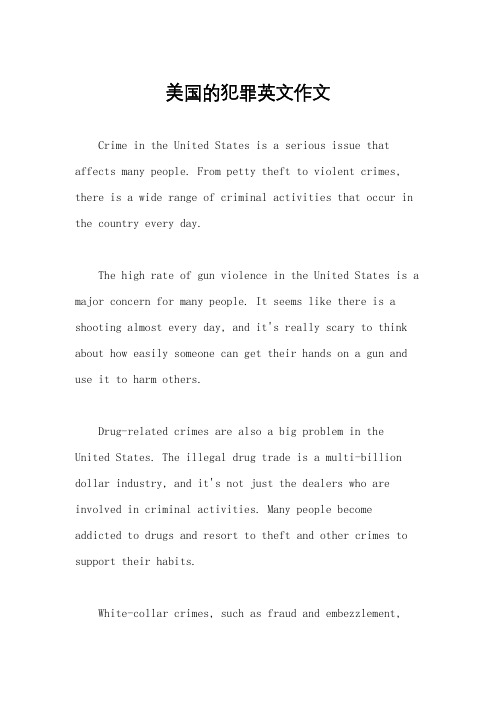
美国的犯罪英文作文Crime in the United States is a serious issue that affects many people. From petty theft to violent crimes, there is a wide range of criminal activities that occur in the country every day.The high rate of gun violence in the United States is a major concern for many people. It seems like there is a shooting almost every day, and it's really scary to think about how easily someone can get their hands on a gun and use it to harm others.Drug-related crimes are also a big problem in the United States. The illegal drug trade is a multi-billion dollar industry, and it's not just the dealers who are involved in criminal activities. Many people become addicted to drugs and resort to theft and other crimes to support their habits.White-collar crimes, such as fraud and embezzlement,are also a significant issue in the United States. These crimes often go unnoticed for a long time, and by the time they are discovered, the perpetrators have usually stolen a large amount of money.Cybercrime is another growing concern in the United States. With the increasing reliance on technology, criminals have found new ways to exploit people through the internet. From identity theft to hacking, cybercrime can have serious consequences for its victims.Gang-related crimes are a major problem in many cities across the United States. Gangs are responsible for a significant amount of violent crime, and their presence can make certain neighborhoods feel very unsafe.Overall, crime is a complex and pervasive issue in the United States. While law enforcement agencies work hard to combat criminal activities, there is still much work to be done to make the country a safer place for everyone.。
预防犯罪(英文)

Of the Means of preventing Crimes.It is better to prevent crimes than to punish them. This is the fundamental principle of good legislation, which is the art of conducting men to the maximum of happiness, and to the minimum of misery, if we may apply this mathematical expression to the good and evil of life. But the means hitherto employed for that purpose are generally inadequate, or contrary to the end proposed. It is impossible to reduce the tumultuous activity of mankind to absolute regularity; for, amidst the various and opposite attractions of pleasure and pain, human laws are not sufficient entirely to prevent disorders in society. Such, however is the chimera of weak men, when invested with authority. To prohibit a number of indifferent actions is not to prevent the crimes which they may produce, but to create new ones, it is to change at will the ideas of virtue and vice, which, at other times, we are told, are eternal and immutable. To what a situation should we be reduced if every thing were to be forbidden that might possibly lead to,a crime? We must be deprived of the use of our senses: for one motive that induces a man to commit a real crime, there are a thousand which excitehim to those indifferent actions which are called crimes by bad laws. If then the probability that a crime will be committed be in proportion to the number of motives, to extend the sphere of crimes will be to increase that probability. The generality of laws are only exclusive privileges,the tribute of all to the advantages of a few.Would you prevent crimes? Let the laws be clear and simple, let the entire force of the nation be united in their defence, let them be intended rather to favour every individual than any particular classes of men, let the laws be feared, and the laws only. The fear of the laws is salutary, but the fear of men is a fruitful and fatal source of crimes. Men enslaved are more voluptuous, more debauched, and more cruel than those who are in a state of freedom. These study the sciences, the interest of nations, have great objects before their eyes, and imitate them; but those, whose views are confined to the present moment, endeavour, amidst the distraction of riot and debauchery, to forget their situation; accustomed to the uncertainty of all events, for the laws determine none, the consequences of their crimes become problematical, which gives an additional force to the strength oftheir passions.In a nation indolent from the nature of the climate, the uncertainty of the laws confirms and increases men's indolence and stupidity. In a voluptuous but active nation, this uncertainty occasions a multiplicity of cabals and intrigues, which spread distrust and diffidence through the hearts of all, and dissimulation and treachery are the foundation of their prudence. In a brave and powerful nation, this uncertainty of the laws is at last destroyed, after many oscillations from liberty to slavery, and from slavery to liberty again.Would you prevent crimes? Let liberty be attended with knowledge. As knowledge extends, the disadvantages which attend it diminish and the advantages increase. A daringimpostor, who is always a man of some genius, is adored by the ignorant populace, and despised by men of understanding. Knowledge facilitates the comparison of objects, by showing them in different points of view. When the clouds of ignorance are dispelled by the radiance of knowledge, authority trembles, but the force of the laws remains immovable. Men of enlightened understanding must necessarily approve those useful conventions which are the foundation of public safety; they compare with the highest satisfaction, the inconsiderable portion of liberty of which they are deprived with the sum total sacrificed by others for their security; observing that they have only given up the pernicious liberty of injuring their fellow-creatures, they bless the throne, and the laws upon which it is established.It is false that the sciences have always been prejudicial to mankind. When they were so, the evil was inevitable. The multiplication of the human species on the face of the earth introduced war, the rudiments of arts,and the first laws, which were temporary compacts, arising from necessity, and perishing with it. This was the first philosophy, and its few elements were just, as indolence and want of sagacity in the early inhabitants of the world preserved them from error.But necessities increasing with the number of mankind, stronger and more lasting impressions were necessary to prevent their frequent relapses into a state of barbarity, which became every day more fatal. The first religious errors, which peopled the earth with false divinities, and created a world of invisible beings to govern the visible creation, were of the utmost service to mankind. The greatest benefactors to humanity were those who dared to deceive, and lead pliant ignorance to the foot of the altar. By presenting to the minds of the vulgar things out of the reach of their senses, which fled as they pursued, and always eluded their grasp which as, they never comprehended, they never despised, their different passions were united, and attached to a single object. This was the first transition of all nations from their savage state. Such was the necessary, and perhaps the only bond of all societies at their first formation.I speak not of the chosen people of God, to whom the most extraordinary miracles and the most signal favours supplied the place of human policy. But as it is the nature of error to subdivide itself ad infinitum, so the pretended knowledge which sprung from it, transformed mankind into a blind fanatic multitude,jarring and destroying each other in the labyrinth in which they were inclosed: hence it is not wonderful that some sensible and philosophic minds should regret the ancient state of barbarity. This was the first epoch, in which knowledge, or rather opinions, were fatal.The second may be found in the difficult and terrible passage from error to truth, from darkness to light. The violent shock between a mass of errors useful to the few and powerful, and the truths so important to the many and the weak, with the fermentation of passions excited on that occasion, were productive of infinite evils to unhappy mortals. In the study of history, whose principal periods, after certain intervals, much resemble each other, we frequently find, in the necessary passage from the obscurity of ignorance to the light of philosophy, and from tyranny to liberty, its natural consequence, one generation sacrificed to the happiness of the next. Butwhen this flame is extinguished, and the world delivered from its evils, truth, after a very slow progress, sits down with monarchs on the throne, and is worshipped in the assemblies of nations. Shall we then believe, that light diffused among the people is more destructive than darkness, and that the knowledge of the relation of things can ever be fatal to mankind?I gnorance may indeed be less fatal than a small degree of knowledge, because this adds to the evils of ignorance, the inevitable errors of a confined view of things on this side the bounds of truth; but a man of enlightened understanding, appointed guardian of the laws, is the greatest blessing that a sovereign can bestow on a nation. Such a man is accustomed to behold truth, and not to fear it; unacquainted with the greatest part of those imaginary and insatiable necessities which so often put virtue to the proof, and accustomed to contemplate mankind from the most elevated point of view, he considers the nation as his family, and his fellow-citizens as brothers; the distance between the great and the vulgar appears to him the less as the number of mankind he has in view is greater.The philosopher has necessities and interests unknown to the vulgar, and the chief of these is not to belie in public the principles he taught in obscurity, and the habit of loving virtue for its own sake. A few such philosophers would constitute the happiness of a nation; which however would be but of short duration, unless by good laws the number were so increased as to lessen the probability of an improper choice.Another method of preventing crimes is, to make the observance of the laws, and not their violation, the interest of the magistrate.The greater the number of those who constitute the tribunal, the less is the danger of corruption; because the attempt will be more difficult, and thepower and temptation of each individual will be proportionably less. If the sovereign, by pomp and the austerity of edicts, and by refusing to hear the complaints of the oppressed, accustom his subjects to respect the magistrates more than the laws, the magistrates will gain indeed, but it will be at the expense of public and private security.Yet another method of preventing crimes is, to reward virtue. Upon this subject the laws of all nations are silent. If the rewards proposed by academies for the discovery of useful truths have increased our knowledge, and multiplied good books, is it not probable that rewards, distributed by the beneficent hand of a sovereign, would also multiply virtuous actions. The coin of honour is inexhaustible, and is abundantly fruitful in the hands of a prince who distributes it wisely.Finally, the most certain method of preventing crimes is, to perfect the system of education. But this is an object too vast, and exceeds my plan; an object, if I may venture to declare it, which is so intimately connected with the nature of government, that it will always remain a barren spot, cultivated only by a few wise men.A great man, who is persecuted by that world he hath enlightened, and to whom we are indebted for many important truths, hath most amply detailed the principal maxims of useful education. This chiefly consists in presenting to the mind a small number of select objects, in substituting the originals for the copies both of physical and moral phenomena, in leading the pupil to virtue by the easy road of sentiment, and in withholding him from evil by the infallible power of necessary inconveniences, rather than by command, which only obtains a counterfeit and momentary obedience.As punishments become more mild, clemency and pardon are less necessary. Happy the nation in which they will be considered as dangerous. Clemency, which has often been deemed a sufficient substitute for every other virtue in sovereigns, should be excluded in a perfect legislation, where punishments are mild, and the proceedings in criminal cases regular and expeditious. This truth will seem cruel to those who live in countries where, from the absurdity of the laws and the severity of punishments, pardons and the clemency of the prince are necessary. It is indeed one of the noblest prerogatives of the throne, but, at the same time, a tacit disapprobation of the laws. Clemency is a virtue which belongs to the legislator, and not to the executor of the laws; a virtue which ought to shine in the code, and not in private judgment. To shew mankind that crimes are sometimes pardoned, and that punishment is not the necessary consequence, is to nourish the flattering hope of impunity, and is the cause of their considering every punishment inflicted as an act of injustice and oppression. The prince in pardoning gives up the public security in favour of an individual, and, by his ill-judged benevolence, proclaims a public act of impunity. Let, then, the executors of the laws be inexorable, but let the legislator be tender, indulgent, and humane. He is a wise architect who erects his edifice on the foundation of self-love, and contrives that the interest of the public shall be the interest of each individual, who is not obliged, by particular laws and irregular proceedings, to separate the public good from that of individuals, and erect the image of public felicity on the basis of fear and distrust; but, like a wise philosopher, he will permit his brethren to enjoy in quiet that small portion of happiness, which the immense system, established by the first cause, permits them to taste on this earth, which is but a point in the universe.A small crime is sometimes pardoned if the person offended chooses to forgive the offender. This may be an act of good nature and humanity, but it is contrary to the good of the public: for although a private citizen may dispense with satisfaction for the injury he has received, he cannot remove the necessity of example. The right of punishing belongs not to any individual in particular, but to society in general, or the sovereign. He may renounce his own portion of this right, but cannot give up that of others.。
犯罪事件英文作文

犯罪事件英文作文It was a dark and stormy night when the crime took place. The sound of thunder and the pouring rain covered up any noise the criminal might have made. The victim was found lying on the ground, unconscious and bleeding. The police were called and the investigation began.The crime scene was a mess, with broken furniture and scattered belongings. It was clear that there had been a struggle. The detectives collected evidence and interviewed witnesses, trying to piece together what had happened. 。
The victim was taken to the hospital and, thankfully, survived the attack. But the trauma of the experience would stay with them for a long time. The police workedtirelessly to find the perpetrator and bring them to justice.After days of investigation, the police finally had a breakthrough. They identified a suspect and brought them infor questioning. The suspect denied any involvement in the crime, but the evidence against them was overwhelming.In the end, the suspect confessed to the crime and was arrested. The victim was able to get closure and the community felt safer knowing that the perpetrator was off the streets. It was a difficult and harrowing experience, but justice had been served.。
部分犯罪的英文词

一些犯罪英文术语大家不要误会哟,偶不是诱导大家犯罪,嘿嘿。
:学习了解一下:accomplice :同案Any person who takes part in a crime.参与犯罪的每个人。
adult business district :红灯区A neighborhood zoned for pornographic bookstores and movie theaters, striptease bars, etc.划定的街区,作为开设色情书店、影院、脱衣舞场等的场所。
agricrime :农业犯罪Sort for agricultural crime. The theft of crops and /or farm equipment."agricultural crime"的缩写词,偷盗庄稼和/或农场设备的犯罪。
armed robbery :武装抢劫The act of using a deadly weapon when raking or attempting to take property form another person or party. 夺取或试图夺取他人或他方财物时使用致命武器的犯罪行为。
arrest warrant :逮捕证A document that orders the arrest of an individual who has been accused with a crime.对被指控犯罪的某人实施搜捕的文件。
arson :纵火The crime of intentionally destroying property by the use of fire.故意放火毁坏财产的犯罪。
assassin :暗杀A murderer. A person who sets out to kill someone, esp. a prominent person.谋杀者。
犯罪事件英文作文

犯罪事件英文作文1. It was a dark and stormy night. The rain was pouring down heavily, creating a gloomy atmosphere in the city. People hurriedly rushed home, seeking shelter from the torrential downpour.2. In the midst of the chaos, a piercing scream cut through the air. It was a scream filled with fear and desperation. The sound echoed through the empty streets, sending shivers down the spines of those who heard it.3. As the police sirens blared in the distance, a crowd started to gather around the source of the scream.Curiosity and concern filled the air as people tried to catch a glimpse of what had happened.4. Among the crowd, there was a sense of unease and suspicion. Whispers of a crime began to circulate, fueling the imagination of those present. Speculations ran wild as people tried to piece together the puzzle.5. The police arrived at the scene, their presence commanding attention and authority. They swiftly cordoned off the area, creating a barrier between the curious onlookers and the unfolding investigation.6. Flashing lights illuminated the surroundings as detectives meticulously combed through the evidence. Their focused expressions revealed the seriousness of the situation, as they pieced together the fragments of the crime.7. The victim, a young woman, lay motionless on the ground, her life prematurely taken away. The tragedy of her untimely death hung heavily in the air, casting a shadow over the city.8. The investigation intensified as the police sought to uncover the truth. They questioned witnesses, searched for fingerprints, and analyzed any potential leads that could bring them closer to the perpetrator.9. Days turned into weeks, and the case remained unsolved. The city became restless, its inhabitants living in fear of the unknown. The once bustling streets now seemed haunted by the specter of the crime.10. Finally, a breakthrough came. A crucial piece of evidence was discovered, linking the crime to a notorious criminal who had eluded capture for years. The news brought a sense of relief and closure to the city.11. The trial began, and the courtroom was filled with anticipation. The victim's family, friends, and the curious public all awaited justice to be served. The accused sat in the defendant's seat, his expression betraying a mix of guilt and defiance.12. After a long and arduous legal battle, the jury reached a verdict. The accused was found guilty, and the weight of his crimes finally caught up with him. The courtroom erupted in a mix of emotions, as justice was served.13. The city slowly began to heal from the wounds of the crime. Life returned to a semblance of normalcy, although the memory of the tragic event would forever be etched in the collective consciousness of its residents.14. As time passed, the crime became a cautionary tale, reminding everyone of the fragility of life and the importance of remaining vigilant. The city learned from its past, determined to create a safer future for its inhabitants.15. And so, the crime became a chapter in the city's history. It served as a reminder of the resilience of its people, who refused to let fear define them. They emerged stronger, united in their pursuit of a brighter tomorrow.。
犯罪类型英文作文

犯罪类型英文作文Robbery is a serious crime that involves taking someone's property through force or threat of force. It can happen in a variety of places, such as on the street, in a store, or even in someone's home. Robbery can be aterrifying experience for the victim and can have long-lasting effects on their sense of security.Fraud is another common type of crime that involves deceiving someone for personal gain. This can include things like identity theft, credit card fraud, or investment scams. Fraudsters often use sophisticatedtactics to trick their victims, making it difficult for law enforcement to catch them.Assault is a violent crime that involves causing physical harm to another person. This can range from a minor altercation to a serious, life-threatening attack. Assault can have serious consequences for both the victim and the perpetrator, and can result in long-term physicaland emotional trauma.Burglary is a crime that involves illegally entering a building with the intent to commit a crime, usually theft. This can happen in homes, businesses, or other types of buildings. Burglary can leave victims feeling violated and unsafe in their own space, and can result in the loss of valuable possessions.Drug trafficking is a type of crime that involves the illegal sale and distribution of drugs. This can have serious consequences for both the individuals involved and the wider community, including addiction, violence, and other criminal activity. Drug trafficking is a complex and widespread issue that law enforcement agencies around the world are constantly working to combat.Cybercrime is a growing type of crime that involves using computers and the internet to commit illegal activities. This can include things like hacking, identity theft, and online scams. Cybercrime presents unique challenges for law enforcement, as it often crossesinternational borders and can be difficult to trace.Human trafficking is a particularly heinous type of crime that involves exploiting and controlling people for profit. This can include forced labor, sexual exploitation, and other forms of modern slavery. Human trafficking is a global issue that affects millions of people, and requires coordinated efforts from law enforcement and other organizations to combat.。
和警察打交道用得着的英语
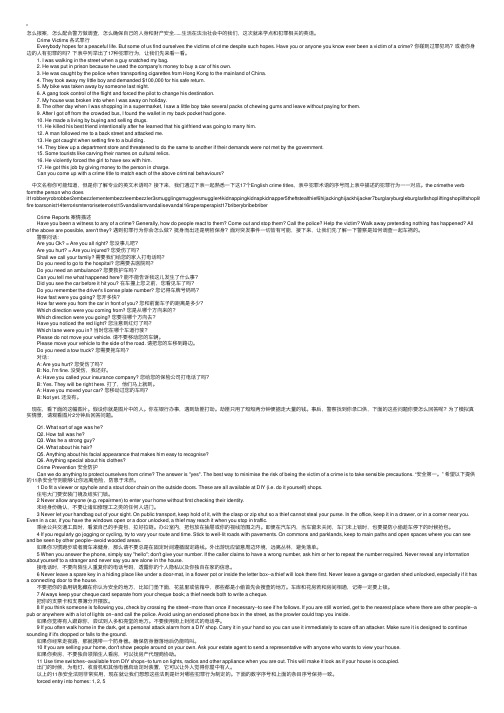
怎么报案,怎么配合警⽅做调查,怎么确保⾃⼰的⼈⾝和财产安全......⽣活在法治社会中的我们,这次就来学点和犯罪相关的英语。
Crime Victims 各式罪⾏ Everybody hopes for a peaceful life. But some of us find ourselves the victims of crime despite such hopes. Have you or anyone you know ever been a victim of a crime? 你碰到过罪犯吗?或者你⾝边的⼈有犯罪的吗?下表中列举出了17种犯罪⾏为,让我们先来看⼀看。
1. I was walking in the street when a guy snatched my bag. 2. He was put in prison because he used the company's money to buy a car of his own. 3. He was caught by the police when transporting cigarettes from Hong Kong to the mainland of China. 4. They took away my little boy and demanded $100,000 for his safe return. 5. My bike was taken away by someone last night. 6. A gang took control of the flight and forced the pilot to change his destination. 7. My house was broken into when I was away on holiday. 8. The other day when I was shopping in a supermarket, I saw a little boy take several packs of chewing gums and leave without paying for them. 9. After I got off from the crowded bus, I found the wallet in my back pocket had gone. 10. He made a living by buying and selling drugs. 11. He killed his best friend intentionally after he learned that his girlfriend was going to marry him. 12. A man followed me to a back street and attacked me. 13. He got caught when setting fire to a building. 14. They blew up a department store and threatened to do the same to another if their demands were not met by the government. 15. Some tourists like carving their names on cultural relics. 16. He violently forced the girl to have sex with him. 17. He got this job by giving money to the person in charge. Can you come up with a crime title to match each of the above criminal behaviours? 中⽂名称你可能知道,但是你了解专业的英⽂术语吗?接下来,我们通过下表⼀起熟悉⼀下这17个English crime titles,表中犯罪术语的序号同上表中描述的犯罪⾏为⼀⼀对应。
Unit6单词讲义高中英语选择性3
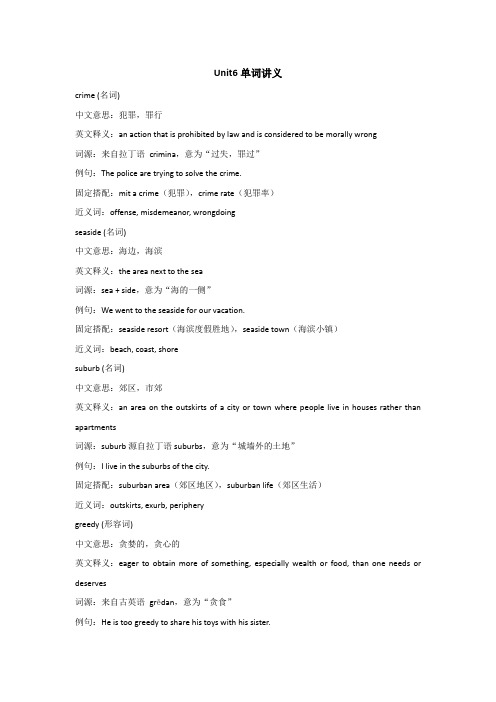
Unit6单词讲义crime (名词)中文意思:犯罪,罪行英文释义:an action that is prohibited by law and is considered to be morally wrong词源:来自拉丁语crimina,意为“过失,罪过”例句:The police are trying to solve the crime.固定搭配:mit a crime(犯罪),crime rate(犯罪率)近义词:offense, misdemeanor, wrongdoingseaside (名词)中文意思:海边,海滨英文释义:the area next to the sea词源:sea + side,意为“海的一侧”例句:We went to the seaside for our vacation.固定搭配:seaside resort(海滨度假胜地),seaside town(海滨小镇)近义词:beach, coast, shoresuburb (名词)中文意思:郊区,市郊英文释义:an area on the outskirts of a city or town where people live in houses rather than apartments词源:suburb源自拉丁语suburbs,意为“城墙外的土地”例句:I live in the suburbs of the city.固定搭配:suburban area(郊区地区),suburban life(郊区生活)近义词:outskirts, exurb, peripherygreedy (形容词)中文意思:贪婪的,贪心的英文释义:eager to obtain more of something, especially wealth or food, than one needs or deserves词源:来自古英语grēdan,意为“贪食”例句:He is too greedy to share his toys with his sister.固定搭配:greedy for(渴望得到),greedy person(贪婪的人)近义词:avaricious, covetous, graspingthief (名词)中文意思:小偷,窃贼英文释义:a person who steals things illegally词源:来自古英语þiof,意为“偷窃者”例句:The thief was caught by the police.固定搭配:thief stealer(窃贼),car thief(汽车窃贼)近义词:burglar, pilferer, robbermit (动词)中文意思:犯罪,做错事;承诺,履行;把…托付给;使承担义务英文释义:to do something illegal or wrong; to promise or undertake to do something; to entrust or give over (something) to someone else; to obligate or bind (someone) to something词源:来自拉丁语mittere,意为“托付,交付”例句:He mitted a serious crime. She mitted herself to finishing the project on time. They mitted their children to the care of their grandparents. The pany mitted itself to reducing its carbon footprint.urban:词性:形容词中文意思:城市的,都市的英文释义:of, relating to, or characteristic of a city or town词源:来自拉丁语urbanus,意为“城市的”例句:The urban population has been increasing rapidly in recent years.固定搭配:urban area(城市地区)、urban planning(城市规划)近义词:metropolitan, municipal, townshippredator:词性:名词中文意思:捕食者,掠夺者英文释义:an animal that preys on other animals for food词源:来自拉丁语predator,意为“掠夺者”例句:The lion is the top predator in the African savannah.固定搭配:natural predator(天敌)、predatory behavior(掠夺行为)近义词:hunter, killer, raidernewer:词性:名词中文意思:新来的人,新手英文释义:a person who has recently arrived in a place or started doing something new词源:来自中古英语neweere,意为“新来的人”例句:As a newer to the pany, I'm still learning the ropes.固定搭配:newer to the team(团队的新成员)、newer to the neighborhood(新搬来的邻居)近义词:novice, beginner, rookieflourish:词性:动词中文意思:繁荣,茂盛,兴旺发达英文释义:to grow well and be healthy; prosper; thrive词源:来自古英语flōrishian,意为“繁荣”例句:The economy is expected to flourish in the ing years.固定搭配:flourishing business(兴旺的生意)、flourishing garden(繁茂的花园)近义词:thrive, prosper, succeedracoon:词性:名词中文意思:浣熊,貉子英文释义:a nocturnal mammal with a long bushy tail and dark masked face, living in trees and eating fruit and small animals词源:来自印第安语racaon,意为“尾巴”或“水獭”例句:I saw a raccoon rummaging through the trash cans last night.container:词性:名词中文意思:容器,集装箱英文释义:a receptacle for holding or containing something词源:来自拉丁语的contenere,意为“包含”例句:The container is made of plastic.固定搭配:shipping container(海运集装箱)、trash container(垃圾箱)近义词:box, crate, vesselgarbage:词性:名词中文意思:垃圾,废物英文释义:refuse or waste material that is discarded as unwanted词源:来自中古英语gerbege,意为“残渣”或“残留物”例句:Please take out the garbage before you leave.固定搭配:garbage disposal(垃圾处理)、garbage collector(垃圾收集员)近义词:trash, refuse, wastelamb:词性:名词中文意思:羔羊,小羊肉英文释义:a young sheep that has not yet been castrated词源:来自古英语lambe,意为“小羊”例句:We had roasted lamb for dinner last night.固定搭配:lamb chops(羊排)、lamb stew(炖羊肉)近义词:sheep, ewe's offspringkebab:词性:名词中文意思:烤肉串,烤羊肉串英文释义:a dish consisting of pieces of meat or vegetables skewered and grilled over an open fire or barbecue词源:来自土耳其语kebab,意为“烤肉串”例句:I ordered a kebab from the street vendor.固定搭配:chicken kebab(鸡肉串)、shish kebab(什锦烤肉串)近义词:kabob, shish kabob, gyrogarlic:词性:名词中文意思:大蒜,蒜头英文释义:a bulbous plant with a strongsmelling white fleshy root used in cooking and medicine 词源:来自拉丁语garlic,意为“蒜”例句:I love adding garlic to my pasta dishes.固定搭配:garlic bread(蒜蓉面包)、garlic sauce(蒜泥酱)近义词:bulb, garlic clovesestimate:词性:动词/名词中文意思:估计,估价英文释义:to form an approximate opinion or calculation of (something);a rough calculation or approximation词源:来自拉丁语estimare,意为“评估”例句:I estimated that it would take me two hours to finish the task.固定搭配:estimate cost(估算成本)、estimate time(估计时间)近义词:assess, evaluate, gaugemigratory:词性:形容词中文意思:迁移的,迁徙的英文释义:of or relating to migration词源:来自拉丁语migrare,意为“移动”例句:Many birds are migratory and travel long distances every year.固定搭配:migratory bird(候鸟)、migratory pattern(迁徙模式)近义词:nomadic, wandering, itinerantappreciate:词性:动词中文意思:欣赏,感激,增值英文释义:to recognize the quality, value, or significance of; to increase in value or price词源:来自拉丁语appretiare,意为“珍视”例句:I appreciate your help with this project.固定搭配:appreciate art(欣赏艺术)、appreciate music(欣赏音乐)近义词:value, admire, cherishcrucial:词性:形容词中文意思:关键的,重要的英文释义:extremely important, decisive, or critical词源:来自中古英语crucialen,意为“决定性的”例句:Your cooperation is crucial to the success of this project.固定搭配:crucial decision(关键决策)、crucial moment(关键时刻)近义词:critical, essential, vitalrestrict:词性:动词中文意思:限制,约束英文释义:to limit the freedom, movement, or activity of; to impose a restriction on词源:来自拉丁语restrictus,意为“被束缚的”例句:The new policy restricts access to certain areas of the building.固定搭配:restrict access(限制进入)、restrict movement(限制行动)近义词:limit, confine, restrainhiker:词性:名词中文意思:徒步旅行者,远足者英文释义:a person who hikes, especially one who hikes for pleasure or exercise词源:来自美国英语,由动词hike 衍生而来,意为“徒步旅行”例句:The hiker reached the summit after a long and strenuous climb.固定搭配:day hiker(日间徒步旅行者)、backpacker hiker(背包客徒步旅行者)optimistic:词性:形容词中文意思:乐观的,积极的英文释义:having or showing a belief that good things will happen in the future; hopeful 词源:来自拉丁语optimus,意为“最好的”例句:She is optimistic about her chances of getting the job.固定搭配:optimistic attitude(乐观的态度)、optimistic outlook(乐观的前景)近义词:hopeful, positive, confidentclay:词性:名词中文意思:黏土,泥土英文释义:a plastic earthy material that can be molded when wet and hardens when dry词源:来自古英语clǣg,意为“黏土”例句:The potter used clay to make a vase.固定搭配:clay soil(黏土土壤)、clay sculpture(黏土雕塑)近义词:earth, mud, dirtcave:词性:名词/动词中文意思:洞穴,坍塌英文释义:a natural underground chamber or space;to collapse or fall inward suddenly词源:来自拉丁语cavea,意为“洞穴”例句:They explored the dark cave with flashlights. (名词) The roof of the tunnel began to cave in. (动词)固定搭配:cave system(洞穴系统)、cave painting(岩画)近义词:cavern, grotto, holeindoors:词性:副词中文意思:在室内,进屋里英文释义:inside a building or room词源:来自中古英语indoures,意为“在室内”例句:It's too cold outside, let's stay indoors.固定搭配:indoor activities(室内活动)、indoor sports(室内运动)近义词:indoor, inside, internallyconsumption:词性:名词中文意思:消费,消耗英文释义:the act of using up or consuming something, especially food or fuel词源:来自拉丁语consumptio,意为“消耗”例句:The consumption of energy has increased in recent years.固定搭配:consumption pattern(消费模式)、consumption tax(消费税)近义词:use, expenditure, depletionsupplement:词性:名词/动词中文意思:补充,增补品,附录英文释义:something added to plete what is lacking;an addition to a book or magazine that provides extra information or details词源:来自拉丁语supplementum,意为“增加”或“补充”例句:I take a vitamin supplement every day. (名词) We need to supplement our ine with a parttime job. (动词)固定搭配:supplementary material(补充材料)、supplemental insurance(附加保险)eliminate:词性:动词中文意思:消除,消灭英文释义:to get rid of something or someone pletely词源:来自拉丁语eliminare,意为“清除”例句:We need to eliminate all the errors in this report.固定搭配:eliminate poverty(消除贫困)、eliminate petition(消除竞争)近义词:remove, eradicate, abolishfirefighter:词性:名词中文意思:消防员英文释义:a person whose job is to put out fires and save lives词源:由fire 和fighter 组成,意为“与火战斗的人”例句:The firefighters worked tirelessly to put out the flames.固定搭配:firefighting equipment(消防设备)、firefighting team(消防队)近义词:fireman, rescuer, emergency responderblaze:词性:名词/动词中文意思:火焰,烈火;燃烧,闪耀英文释义:a large bright flame;to burn fiercely or brightly词源:来自古英语blǣsan,意为“燃烧”例句:The blaze from the fireplace warmed the room. (名词) The forest was blazing with autumn colors. (动词)固定搭配:forest blaze(森林大火)、bonfire blaze(篝火熊熊燃烧)近义词:flame, conflagration, bustionfierce:词性:形容词中文意思:凶猛的,猛烈的,强烈的英文释义:extremely violent, harsh, or strong; showing extreme anger or determination词源:来自拉丁语ferus,意为“野生的”或“狂野的”例句:The lion attacked with a fierce roar.固定搭配:fierce petition(激烈的竞争)、fierce storm(猛烈的风暴)近义词:savage, violent, intensereact:词性:动词中文意思:反应,回应,作出反应英文释义:to behave in a particular way because of something that has happened or been said 词源:来自拉丁语re "back" + actus "action",意为“向后行动”或“做出反应”例句:She reacted angrily to the news.固定搭配:react quickly(迅速反应)、react negatively(负面反应)近义词:respond, answer, engagemonthly:词性:形容词/副词/名词中文意思:每月的,按月的;每月一次的;月刊英文释义:happening once every month; relating to or occurring once a month; a magazinepublished once a month词源:来自拉丁语mensis,意为“月份”例句:I receive a monthly salary. (形容词) She visits her grandmother monthly. (副词) I subscribe to a monthly magazine. (名词)advanced:词性:形容词中文意思:先进的,高级的英文释义:having developed or improved beyond the usual or ordinary level词源:来自拉丁语advenire,意为“到达”或“出现”例句:The pany has invested heavily in advanced technology.固定搭配:advanced degree(高等学位)、advanced weaponry(先进武器)近义词:sophisticated, plex, superiorwipe:词性:动词中文意思:擦,抹,清除英文释义:to clean or dry something by rubbing it with a cloth or one's hand词源:来自古英语wīpan,意为“擦拭”例句:She wiped the tears from her eyes.固定搭配:wipe out(消灭),wipe down(擦拭干净)近义词:clean, erase, removenuclear:词性:形容词/名词中文意思:核能的,原子核的;核武器的英文释义:relating to or involving atoms that have nuclei containing neutrons and protons; relating to or involving nuclear energy or weapons词源:来自拉丁语nuculeus,意为“小果子”或“核心”例句:The country is developing its nuclear power industry. (形容词) The threat of nuclear war is very real. (名词)固定搭配:nuclear energy(核能),nuclear weapons(核武器)近义词:atomic, radioactive, hydrogen bombterrifying:词性:形容词中文意思:令人恐惧的,可怕的英文释义:causing great fear or terror; extremely frightening or shocking词源:来自拉丁语terrere,意为“使害怕”或“使惊吓”例句:The terrifying storm caused widespread damage.固定搭配:terrifying experience(可怕的经历),terrifying speed(惊人的速度)近义词:frightening, alarming, dreadfulhostile:词性:形容词/名词中文意思:敌对的,敌意的;敌人,敌军英文释义:showing or feeling strong dislike or opposition; an enemy or opposing force词源:来自拉丁语hostilis,意为“敌人的”或“敌人的”例句:The hostile crowd shouted insults at the speaker. (形容词) The army launched a surprise attack on the hostile forces. (名词)固定搭配:hostile takeover(敌意收购),hostile environment(敌对环境)近义词:unfriendly, aggressive, antagonisticunmanned:词性:形容词/动词过去分词形式中文意思:无人的,无人驾驶的;未被占据的,无人居住的英文释义:not operated by a person; not occupied by people; not manned by people词源:来自中古英语unmænden,意为“无人的”或“非人类的”例句:The unmanned spacecraft traveled through space for months. (形容词) The abandoned house stood unmanned for years. (动词过去分词形式)spacecraft词性:名词中文意思:宇宙飞船英文释义:a vehicle designed for traveling in outer space词源:space(空间)+ craft(船,飞行器)例句:The spacecraft is scheduled to launch next month.固定搭配:manned spacecraft(载人宇宙飞船),unmanned spacecraft(无人宇宙飞船)近义词:spaceship, satelliteorbit词性:动词、名词中文意思:绕轨道运行;轨道英文释义:to move around (a planet or star) in a curved path; the curved path that an object moves in around a planet or star词源:来自拉丁语orbita,意为“轨道”例句:The moon orbits around the earth.固定搭配:orbital mechanics(轨道力学),orbital debris(轨道碎片)近义词:circular motion, trajectorystunning词性:形容词中文意思:令人惊叹的;极好的英文释义:extremely impressive or beautiful; extremely good词源:来自古英语stundian,意为“使震惊”例句:The view from the top of the mountain was absolutely stunning.固定搭配:stunning performance(出色的表演),stunning victory(惊人的胜利)近义词:astonishing, amazing, incredibleagency词性:名词中文意思:代理;机构;中介英文释义:an organization that provides a particular service or performs a particular function词源:来自拉丁语agens,意为“行动”例句:The travel agency arranged our trip to Europe.固定搭配:agency agreement(代理协议),government agency(政府机构)近义词:organization, bureau, officeconsist词性:动词中文意思:由…组成;包含;存在于英文释义:to be made up of; include; exist in词源:来自拉丁语constare,意为“站立”或“保持不变”例句:The team consists of six players.固定搭配:consist of(由…组成),consist with(符合,与…一致)近义词:prise, include, involveinfer词性:动词中文意思:推断;推论;推知英文释义:to conclude or deduce something from evidence or reasoning词源:来自拉丁语inferre,意为“带出,引出”例句:From his behavior, I can infer that he's not happy.expose词性:动词中文意思:暴露,揭露英文释义:to uncover or make known (something that is hidden or secret)词源:来自拉丁语expositus,意为“被摆出来的”例句:The journalist was accused of exposing state secrets.固定搭配:expose oneself to(使自己暴露于),expose a fraud(揭穿骗局)近义词:uncover, reveal, discloseastronaut词性:名词中文意思:宇航员英文释义:a person who travels in a spacecraft词源:由希腊语astron(星星)和拉丁语nautes(船员)组成例句:He dreamed of being an astronaut since he was a child.固定搭配:bee an astronaut(成为一名宇航员),train astronauts(训练宇航员)近义词:cosmonaut, spaceman, spacewomandust词性:名词、动词中文意思:灰尘,尘土;掸去…的灰尘英文释义:a fine powder consisting of tiny particles of earth, stone, etc.; to remove dust from (something) by brushing or shaking it off词源:来自古英语dust,意为“灰尘”例句:She dusted the furniture with a cloth.固定搭配:dust storm(沙尘暴),dust off(清理,整理),dust bunny(灰尘球)近义词:dirt, grime, pollencapsule词性:名词中文意思:胶囊;太空舱;简要说明英文释义:a small cylindrical container for holding medicine or other substances; a small spacecraft designed for carrying one or more people into orbit around the Earth or for landing on or taking off from a planet's surface; a brief statement or account that presents the main points of something词源:来自拉丁语capsula,意为“小容器”例句:She took two capsules of medicine before going to bed.固定搭配:space capsule(太空舱),sleeping capsule(睡眠舱),audio capsule(音频胶囊)近义词:pod, module, briefcaseexposure词性:名词中文意思:暴露;曝光;曝光时间英文释义:the state of being exposed to something; the action of making something known publicly; the amount of time during which a camera shutter is open and light is allowed to reach the film or sensor in a camera词源:来自中古英语exposure,意为“暴露”例句:The patient's exposure to radiation was minimal.固定搭配:exposure therapy(暴露疗法),sun exposure(阳光暴露),light exposure(光线暴露)近义词:disclosure, revelation, illuminationtrunk词性:名词中文意思:树干;行李箱;象鼻英文释义:the main stem of a tree; a large strong box with a handle for carrying clothes or other things; the long nose of an elephant used for grasping things词源:来自古英语trunk,意为“树干”或“箱子”例句:She packed her clothes in a trunk before leaving for vacation.。
关于犯罪的作文英文作文

关于犯罪的作文英文作文英文:Crime is a serious issue that affects societies all over the world. It can take many forms, from petty theft to violent assault, and it has a profound impact on the lives of both the victims and the perpetrators.One of the most common forms of crime is theft. This can range from shoplifting to burglary, and it often leaves the victims feeling violated and unsafe. For example, a friend of mine recently had her car broken into and her belongings stolen. She felt angry and vulnerable, and it took her a long time to feel secure again.Another serious form of crime is violent assault. This can have devastating physical and emotional effects on the victim. For instance, a family member of mine was mugged on the street and suffered a broken nose and severe bruising. The experience left him feeling anxious and fearful, and hestruggled to trust people for a long time afterwards.In addition to the impact on the victims, crime also has a detrimental effect on the perpetrators. Many people who commit crimes come from difficult backgrounds and may have experienced trauma or abuse themselves. This can lead them to make poor choices and end up in trouble with the law. For example, I know someone who got involved in drug dealing as a teenager because they felt they had no other options. They ended up serving time in prison and it had a lasting impact on their life.Overall, crime is a complex issue with far-reaching consequences. It is important for societies to address the root causes of crime and to provide support for both victims and offenders. By working together to create safer communities and offer opportunities for rehabilitation, we can help to reduce the prevalence of crime and create a more just and compassionate society.中文:犯罪是一个严重的问题,影响着世界各地的社会。
犯罪和越轨行为简述英文

We will be considering a number of individual theories over the next weeks; Left Realism, Marxism, Interactionism and Labelling, all of which can be found in Haralambos ‘Themes and Perspectives’ in the Crime and Deviance chapter, as well as on the ‘Sociology at Hewett’ web-site.
Crime and Deviance
Some acts, previously considered deviant and/or criminal, may well become routine and unexceptional in the future (and vice-versa). Can you think of any examples?
Crime and Deviance
Social Control – the concepts of ‘socialisation,’ ‘norms and values’, deviancy and conformity should all lead you to ask questions along the lines of – what is ‘normal,’ and who decides? That is the issue of most concern to Sociologists. Which social groups are empowered to have their conceptions of the above accepted as part of the prevailing order? Whoever it is will clearly enjoy a great measure of influence over the behaviour of others. To be able to categorise some behaviours as ‘deviant’ and others as ‘normal’ suggests real power.
法律英语词汇解释
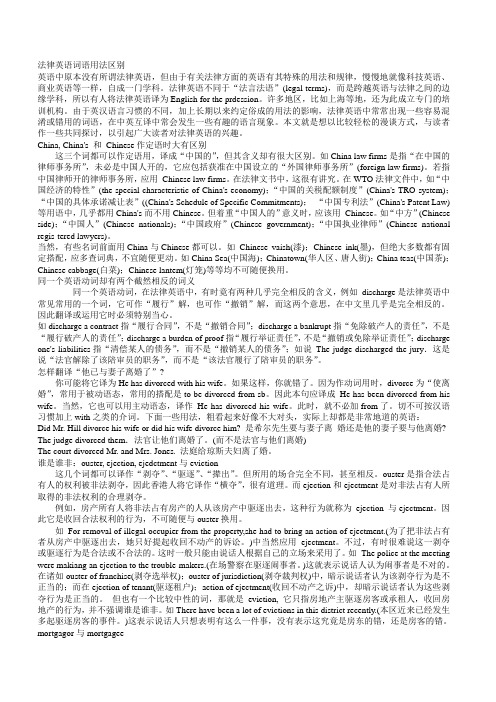
法律英语词语用法区别英语中原本没有所谓法律英语,但由于有关法律方面的英语有其特殊的用法和规律,慢慢地就像科技英语、商业英语等一样,自成一门学科。
法律英语不同于“法言法语”(legal terms),而是跨越英语与法律之间的边缘学科,所以有人将法律英语译为English for the prdession。
许多地区,比如上海等地,还为此成立专门的培训机构。
由于英汉语言习惯的不同,加上长期以来约定俗成的用法的影响,法律英语中常常出现一些容易混淆或错用的词语,在中英互译中常会发生一些有趣的语言现象。
本文就是想以比较轻松的漫谈方式,与读者作一些共同探讨,以引起广大读者对法律英语的兴趣。
China, China's 和Chinese作定语时大有区别这三个词都可以作定语用,译成“中国的”,但其含义却有很大区别。
如China law firms是指“在中国的律师事务所”,未必是中国人开的,它应包括获准在中国设立的“外国律师事务所”(foreign law firms)。
若指中国律师开的律师事务所,应用Chinese law firms。
在法律文书中,这很有讲究。
在WTO法律文件中,如“中国经济的特性”(the special characteristic of China's economy);“中国的关税配额制度”(China's TRO system);“中国的具体承诺减让表”((China's Schedule of Specific Commitments);“中国专利法”(China's Patent Law)等用语中,几乎都用China's而不用Chinese。
但着重“中国人的”意义时,应该用Chinese。
如“中方”(Chinese side);“中国人”(Chinese nationals);“中国政府”(Chinese government);“中国执业律师”(Chinese national regis-tered lawyers)。
电影类型英文表达

电影类型英文表达今天我们来讨论一下电影类型的英文表达,电影类型是一种重要的分类,每种类型都有自己独特的特点,让我们一起来看看这些英文电影类型吧!Action Movie:行动片Action Movie也称为动作片或行动片,其特点是节奏汹涌、动作场面紧凑,有强大的悬念和惊险的把戏,用得最多的就是特效或拆穿设定。
常见的行动片有《蝙蝠侠》、《星球大战》、《速度与激情》等等。
Comedy Movie:喜剧片Comedy Movie也称为喜剧片,其特点是搞笑、轻松、幽默有趣,把荒谬、情感和矛盾都处理得巧妙,引人入胜。
常见的喜剧片有《肖申克的救赎》、《大话西游》、《泰坦尼克号》等等。
Romance Movie:浪漫片Romance Movie也称为浪漫片,其特点是浪漫、温馨,内容以爱情故事为主,描写恋爱旅程中的困境、挣扎和幸福。
常见的浪漫片有《恋恋笔记本》、《诺丁山》、《童话镇》等等。
Sci-fi Movie:科幻片Sci-fi Movie也称为科幻片,其特点是以科学技术和超自然为主,有着天马行空的想象力和视觉效果,穿梭在宇宙、未来、反乌托邦和恐怖世界中。
常见的科幻片有《银河护卫队》、《机器纪元》、《黑客帝国》等等。
Adventure Movie:冒险片Adventure Movie也称为冒险片,其特点是向往探险、不断挑战,紧张刺激、悬念迭起,主要讲述发生在冒险场景中的故事,有着强烈的行动和奇幻感。
常见的冒险片有《印第安纳琼斯》、《夺宝奇兵》、《指环王》等等。
Western Movie:西部片Western Movie也称为西部片,其特点是以西部大漠地区为背景,充满着狙击、枪战、马上劫持和拼杀的紧张气氛,展示着大草原的热情奔放。
常见的西部片有《真实的谎言》、《黄金三镖客》、《从地狱到天堂》等等。
Animation Movie:动画片Animation Movie也称为动画片,其特点是以电脑或漫画的形式,创造出的虚拟世界,形象生动、可爱、童趣横生,哲理内涵深刻,表达了很多精彩的故事。
犯罪的危害 英文作文
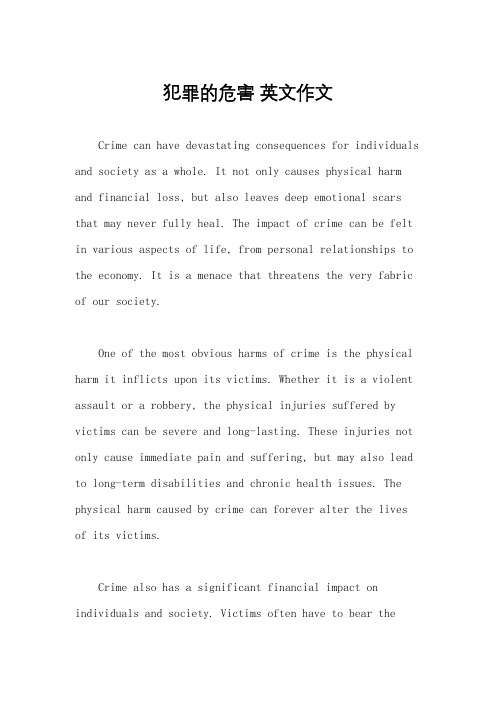
犯罪的危害英文作文Crime can have devastating consequences for individuals and society as a whole. It not only causes physical harm and financial loss, but also leaves deep emotional scars that may never fully heal. The impact of crime can be felt in various aspects of life, from personal relationships to the economy. It is a menace that threatens the very fabric of our society.One of the most obvious harms of crime is the physical harm it inflicts upon its victims. Whether it is a violent assault or a robbery, the physical injuries suffered by victims can be severe and long-lasting. These injuries not only cause immediate pain and suffering, but may also lead to long-term disabilities and chronic health issues. The physical harm caused by crime can forever alter the lives of its victims.Crime also has a significant financial impact on individuals and society. Victims often have to bear thecosts of medical treatment, property damage, and legal fees. In addition, the loss of personal belongings or assets can have a devastating effect on individuals, especially those who may not have the means to recover from such losses. Moreover, the costs of crime extend beyond individual victims, as society as a whole bears the burden ofincreased healthcare expenses, security measures, and the need for a larger law enforcement presence.Beyond the physical and financial harm, crime leaves a lasting emotional impact on its victims. The fear andtrauma experienced during a criminal incident can lead to anxiety, depression, and post-traumatic stress disorder. Victims may struggle to regain a sense of security and trust, and their overall quality of life may besignificantly diminished. The emotional toll of crime can ripple through families and communities, affecting not only the direct victims but also their loved ones and those who witness the aftermath.Crime also undermines the social fabric of our society. It erodes trust between individuals and communities,leading to a breakdown in social cohesion. People become more suspicious of one another, and the sense of belonging and solidarity that is crucial for a functioning society is weakened. This can result in a cycle of fear and isolation, as individuals withdraw from community engagement and cooperation.Furthermore, crime has a detrimental effect on the economy. It hampers economic growth by diverting resources away from productive activities towards security measures and law enforcement. Businesses may suffer from decreased consumer confidence and increased costs associated with crime prevention. Additionally, the reputation of a community or a country can be tarnished by high crime rates, deterring potential investors and tourists.In conclusion, the harms of crime are far-reaching and multifaceted. It causes physical, financial, and emotional harm to its victims, while also undermining social cohesion and hindering economic development. Addressing crimerequires a comprehensive approach that focuses not only on punishment but also on prevention, rehabilitation, andcommunity support. Only by tackling the root causes of crime can we hope to build a safer and more harmonious society.。
案件的英文名词解释
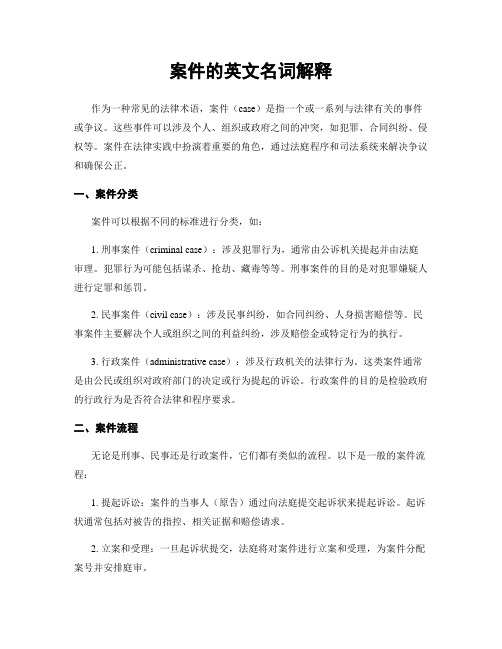
案件的英文名词解释作为一种常见的法律术语,案件(case)是指一个或一系列与法律有关的事件或争议。
这些事件可以涉及个人、组织或政府之间的冲突,如犯罪、合同纠纷、侵权等。
案件在法律实践中扮演着重要的角色,通过法庭程序和司法系统来解决争议和确保公正。
一、案件分类案件可以根据不同的标准进行分类,如:1. 刑事案件(criminal case):涉及犯罪行为,通常由公诉机关提起并由法庭审理。
犯罪行为可能包括谋杀、抢劫、藏毒等等。
刑事案件的目的是对犯罪嫌疑人进行定罪和惩罚。
2. 民事案件(civil case):涉及民事纠纷,如合同纠纷、人身损害赔偿等。
民事案件主要解决个人或组织之间的利益纠纷,涉及赔偿金或特定行为的执行。
3. 行政案件(administrative case):涉及行政机关的法律行为。
这类案件通常是由公民或组织对政府部门的决定或行为提起的诉讼。
行政案件的目的是检验政府的行政行为是否符合法律和程序要求。
二、案件流程无论是刑事、民事还是行政案件,它们都有类似的流程。
以下是一般的案件流程:1. 提起诉讼:案件的当事人(原告)通过向法庭提交起诉状来提起诉讼。
起诉状通常包括对被告的指控、相关证据和赔偿请求。
2. 立案和受理:一旦起诉状提交,法庭将对案件进行立案和受理,为案件分配案号并安排庭审。
3. 庭审:在庭审过程中,双方当事人将提供证据、陈述论据,并接受法官的质询和辩论。
庭审的目的是为法官了解案件的事实和证据,以做出公正的判决。
4. 判决:庭审结束后,法官将考虑证据和法律规定,根据相关法律和判例作出判决。
判决是案件结束的结果,它可能包括定罪、宣判赔偿金、命令执行特定行为等。
5. 上诉:不满意判决的当事人可以根据法律规定进行上诉。
上诉程序通常要求将案件提交给更高级别的法院进行复审。
6. 执行判决:一旦判决生效,胜诉的当事人可以通过执行程序执行判决,如强制执行或向被告追讨赔偿金。
三、案件的法律后果案件的结果可能对当事人产生重大的法律后果。
- 1、下载文档前请自行甄别文档内容的完整性,平台不提供额外的编辑、内容补充、找答案等附加服务。
- 2、"仅部分预览"的文档,不可在线预览部分如存在完整性等问题,可反馈申请退款(可完整预览的文档不适用该条件!)。
- 3、如文档侵犯您的权益,请联系客服反馈,我们会尽快为您处理(人工客服工作时间:9:00-18:30)。
词汇
arson : 纵火 assassin : 暗杀 assault : 袭击 attack dog : 攻击犬 bail : 保释金 ballistics : 弹道学 blackmail : 敲诈,勒索 black market : 黑市 blood money : 血腥钱 body bag : 装尸袋 bomb squad : 爆破小组 bootlegging : 贩卖违禁品 break-in : 非法闯入 bribery : 行贿受贿 bucket shop : 投机商号 bug : 窃听 bum rap : 错捕 burglary : 入室盗窃 car bangers : 汽车窃贼 career criminal : 职业罪犯 child abuse : 虐待儿童
Crld the view that the best way of reducing crimes is to prolong the crime sentence. Others, however, think that there are better alternatives to reduce the crime rate. Discuss both sides and state your own opinion. The rise of crime rate often goes with (伴随、搭配 协调)the rapid development of economy, which is especially true in today’s China. In combating crimes( 打 击犯罪)people are thinking of different ways of solution, one of which is to prolong the penalty terms (延长惩罚 期限).
词汇
criminal : 犯罪 chop shop : 地下拆车厂 deadly weapon : 致命武器 cocaine : 可卡因 death penalty :死刑 computer cleaner : 消除财务信息的电 death row : 死囚牢房 脑黑客 defendant : 被告 con artist : 行骗高手 .domestic violence : 家庭暴力 con game : 骟局 drug abuse : 吸毒 convict : 囚犯 .drug king (czar) : 毒枭 counterfeit : 伪造 drunk driving : 酒后驾驶 credit-card fraud : 信用卡欺诈 edp crimes : 电脑犯罪 crime of passion : 激情犯罪;冲动犯罪 embezzlement : 贪污 crime rate : 犯罪率 first-degree murder : 一级谋杀案
In my opinion, prolonging crime sentence is no sensible(明智的) solution against the crime rate. Only by joining the efforts of the police and the society, establishing a fair and more harmonious social environment, can we effectively ensure our own security.
Proponents of this idea (这个想法的支持者) stress that increased penalty terms against crimes will effectively deter (抵制、 制止) potential criminals, who would think twice (仔细考虑,三 思而后行)or change their mind before any bold action if they consider the prolonged imprisonment (关押,监禁)might be inflicted (施以,施加 sth. is inflicted on somebody 把某物施加 于某人)on them. A recent national crime survey has revealed that about 70% of police officers complain that the “cost” for committing crimes(犯罪) is at a historically low level and that this may in some sense “encourage” bold and vicious actions (鲁莽恶意的行为).
However, many criminologists (犯罪学家;犯罪学)do not share this theory, criticizing this idea as “cowards’ solution”, and pointing out that it will threaten judicial fairness (司法公正)as well as arouse hatred (激起 愤恨) in criminals so as to(以至于) deteriorate(使恶化) the effects of crime sentences. They insist that more rational solutions be taken instead. Firstly, more efforts shall be made to publicize the present laws(宣传现 行法律), so that every citizen is better aware of the consequences of breaking laws; secondly, more civil organizations can be set up to supervise and help investigate into crimes; thirdly, imprisoned (v. 使某 人入狱,监禁)criminals shall receive better education in practical skills with which they can make a decent living without committing crimes when they return home.
词汇
触犯法律——break/ violate/ flout/ disobey the law 犯罪——commit a crime 罪行——offences/ crimes/ criminal acts 罪犯——criminal/ offender/ culprit /perpetrator 从犯——accomplice / accessory (noun) 囚犯——inmate/convict 心理创伤——trauma 被绳之以法——be brought to justice 青少年犯罪——juvenile delinquency 武装抢劫——armed robbery
